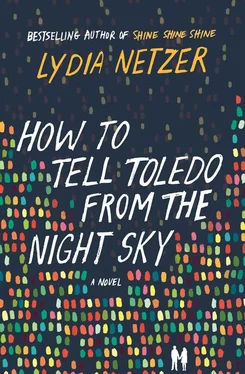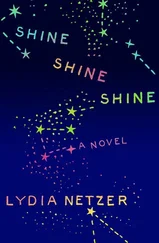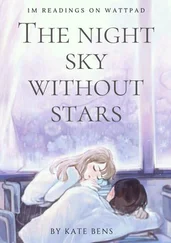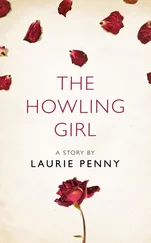She is nodding her head. She is shrugging. “If you want to call it that. I tried to get her to stop, but she kept going. I tried to pull the plug, but she wouldn’t leave us alone. All those years, she kept at it. She wouldn’t stop spying on him, trying to get you two aligned. Everything we did, she did with you. It was so annoying! As if she didn’t realize, wouldn’t realize—I’m not like her!”
“We’re not in love?”
“It was only science,” she says. “It was a good plan. But she wasn’t worth it, and now here we are.”
She fades in and out as I stop looking directly at her. I hold my hands out in front of me, and I look at them. They look like monster hands. I know that if I saw a dream mirror, I would see a monster face looking back. Everything I have ever worried about myself, coming out the mouth of this put-together woman and her big bossy mouth. I am worthless. I am the most insignificant blob of cells, of all the cell blobs there are walking around. I am unwanted. I am a creature formed for a purpose and I am failed in my purpose and there is no purpose left for me. I feel the most terrible despair.
I get off the stalled moped and I begin to walk, and I walk past her where she is still standing there, so tall and still. She keeps making words come out of her mouth that I cannot hear. She is shrieking. She is calling to me. She is saying STOP STOP or she is saying YOU ARE FILTH ANYWAY SO JUST GO AND BE SAD or she is saying YOUR MOTHER IS YOU or whatever she is saying. She can’t grab me or touch me at all. When I am past her I can’t tell anymore what she’s saying, and it doesn’t matter, because I’m going where I have always belonged, and to the place that I see I have created for myself long ago, to use when I most need it, which is now. I walk to the edge of the hole in the middle of Dark House, and without waiting or thinking, I lean forward, and I fall in. And I am gone. It doesn’t even feel terrible.
* * *
The first thing I remember, falling into the hole in Dark House, is my mother standing in the basement next to the ironing board, throwing clothes into a bag. I am ten. I am crying, saying, “Please, don’t go.” But my mother fiercely, angrily stows things in this black garbage bag, storming around the basement like she is cutting her life apart with an ax. “I would kill myself,” says my mother in this memory. “I would kill, kill, kill, kill myself if I wasn’t afraid to go to hell. After all this time, I think I’m actually afraid to go there!” And then my mother laughs a dry, humorless laugh and marches up the basement stairs. I remember reaching out to grab her by the elbow, begging her to stay, and now she swings around and snaps. “Don’t you touch me! Don’t touch me!”
The second thing I see is a moment when I was older, maybe twelve. I had been prescribed a dental retainer to wear during the day and at night. But it got left on my lunch tray at school, and I threw it out with the garbage. Twice. I see myself walking upstairs to find my mother lying in bed with her arm over her face. I remember standing inside the door, telling her about the thrown-away retainer really fast, and then slipping out into the hallway. In seconds, my mother is on me, her teeth bared. “You ungrateful, arrogant arrogant arrog.” My mother’s breath, her body, her hair, even her skin smell of gin. “This is the limit, the limit,” she says to me. “I will take your model rockets, and I will melt them down. It will be plastic for plastic on the kitchen stove: you throw away your plastic, I throw away your plastic, plastic for plastic, for plastic, for plastic.” I can feel her hand grinding into the meat above my elbow. Her feet, bloated and mottled, sticking out from below her flannel nightgown.
The third thing I remember is new: from before the fire. A fog has been lifted between me and my own mind, and I can see this for the first time:
I am standing on the road outside George’s country house. I am young, almost three, and my mother and I are taking a walk. The fire hasn’t happened yet. I am falling forward, rushing down through the hole in Dark House, terrifically afraid, but I can’t stop myself from remembering it. I am afraid to think, afraid for what horror might be waiting for me, what painful memory from the time that I forgot. What have I been hiding from my own brain for all these years behind the wall of the fire? But I cannot pull away. Because I am holding my mother’s hand.
“Look, mother,” I say. “It’s the naked hairy ape!”
“Irene,” says my mother. “Shhh. Let’s go into the house.”
In front of us, on the other side of the street, there is a neighbor clipping his long rows of hedges without his shirt on. Clipping and clipping hedges, with all his gray hair curling up from under his arms, out from his chest, up his back and into the back of his head. I remember this man. He lived next door.
Back in the house, my mother is, laughing, talking to someone.
“I’ve called him that a thousand times just talking to you!” My mother laughs. I am looking at the back of her head and I cannot see the other person, but I hear laughter. “Of course I didn’t realize she was picking up on it! She just called him that to his face!” The two people convulse with laughter. They cannot stop.
I remember violets. Violets in my hand, picked from the cracks of the patio bricks. A wave of violets. I remember these violets were before the fire. Before the fire, I remember a boy in the other high chair. It’s George. He is looking right at me.
And then I understand that the reason I could not remember the things that happened before the fire was not because these memories were so sad, but because they were so happy. I was so, so happy back then.
“I am going to San Francisco, George,” said Irene. “To that conference where Lebernov invited me to sit on a panel. Then I’m moving to Bowling Green. I already found a place, on Clough. Some poor idiot already dropped out of school. Parents desperate to sublet.”
He sat at his desk. She stood in the doorway to his lab. They hadn’t spoken in days. There was, ridiculously, a disco ball hanging from the ceiling. In the floor, scratch marks and shavings outlined the holes that had been freshly drilled. Poles of varying heights stuck into the holes, and on the poles were mounted galaxies, nebulas, the major landmarks of the near universe as George knew it, set up in a 3-D model.
“I don’t understand,” said George. “I thought you weren’t going to that thing. I thought you wouldn’t fly.”
“They’re trying to apply my substrate to radiation detectors in nuclear power plants. I just got off the phone with Lebernov, and again he strongly encouraged me to go.”
“So go,” he said grimly. “But moving to Bowling Green is a little extreme.”
“Ask your mother about it,” said Irene.
“I did ask her,” said George. “You were there. She said a bunch of crap that doesn’t matter.”
“Don’t you get it?” Irene said. “They were friends. They planned the whole thing, George. Your mother and mine. All those little things you thought were fate? No. Plants. They plotted and organized it. All those things my mother said to you, you thought she was reading from the stars? No. She knew you when you were a baby. Probably if she hadn’t been so wasted by alcohol and you hadn’t been so tipsy and heartbroken, you would have remembered her, too. But whatever. You’re right; it actually doesn’t matter. We’ve been played.”
“I don’t care,” said George. “It’s not important. It doesn’t change anything.”
Irene let out a dry laugh. “It changes everything. Whatever we thought was happening wasn’t happening. The Yeats poem? They decided when we’d both memorize it. You went to Thailand on vacation—my grandmother lived in Thailand for years. Kismet? No. Thoughtful planning. Joke’s on us. You’re right—it never mattered.”
Читать дальше












